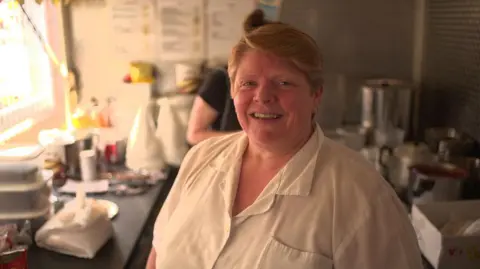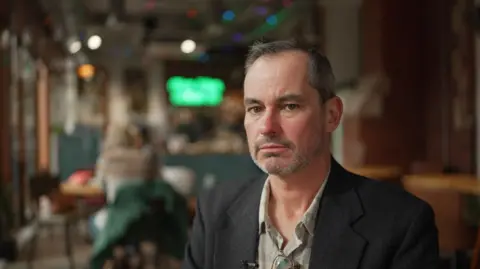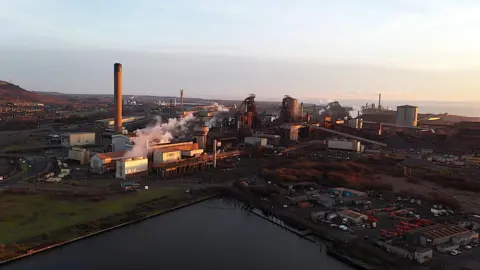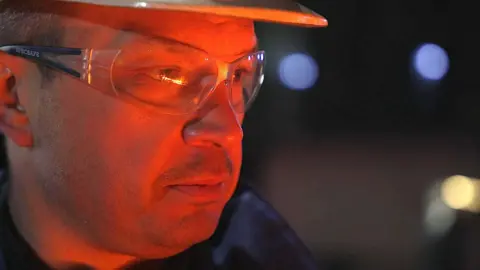Tata Steel: Families put plans on hold amid job loss worries

By Paul Heaney, BBC Wales Investigates
 Owen Midwinter
Owen MidwinterOwen Midwinter thought he had a “job for life” when he started a five-year apprenticeship at Tata Steel in Port Talbot.
But 18 months on, that security has been replaced with uncertainty – and the 23-year-old and his girlfriend may have to delay their plans to start a family.
New analysis for the BBC suggests his town could lose more than £200m in wages because of job cuts at the steelworks.
Prof Calvin Jones, its author, said it was an “end of an era” for UK steelmaking, similar to the closure of coal mines in the 1980s.

Mr Midwinter said of when the job losses were announced: “Everyone in the room went silent… wives and girlfriends were ringing, one of the boys had to go for a walk to clear his head.
“My old man’s been here for years and years, my grandfather’s been here and it was a proud moment for me. But it’s very sombre now, a lot of sad faces, lot of depression.”
His girlfriend, Cori, said: “If Owen loses his job it puts the house at risk, we want to start a family soon, but it puts everything at risk until we know.”

Town of Steel – BBC Wales Investigates
Watch the full programme on BBC iPlayer.
Tata said it needed to “act now” to protect the future of the business by closing blast furnaces and moving to greener ways of producing steel, which require fewer people.
Some experts say a lack of a clear strategy by successive UK governments is behind the job cuts in the well-paid industry, which may never be replaced.

But it is not just steelworkers who are facing uncertainty.
A stone’s throw from the Port Talbot plant that dominates the skyline in this part of the south Wales coast, Mandie Pugh runs a catering business built on the trade of the workers.
“I’ve been here 35 years, a long time, and I’m too young to retire,” she said.
“Contractors, small businesses, from the vegetable man to the window cleaner, people are not going to be able to afford as much any more.
“My husband works at the steelworks, my son is in the control room in the blast furnace so he’s out of a job, he’s just had a baby not long ago, he and his partner are looking for a house so that’s put the kibosh on that.
“I’m gutted for him.”

Prof Jones, from Cardiff University, carried out the research for BBC Wales Investigates.
It suggests that the 2,000 or so jobs lost directly at Tata sites in Wales could be joined by a further 3,000 roles that rely on Tata for trade.
But he said the most “alarming” figures were on the impact of wages in Port Talbot.
The economics professor estimated the job losses at Tata would see a 10% drop in the town’s gross earnings – £133m a year.
If half of the supply companies were based locally, he estimated the drop in earnings would be 15% – more than £200m.
“That’s £200m a year gone from a local economy until those people find new jobs or other employment comes in.
“So, I guess the question will be what happens instead?
“We have not had an industrial strategy worthy of the name for 40 years… we don’t seem to know where we want to go industrially, so it’s no surprise you don’t get there.
“I think more widely, in the same way as the miners strike and thereafter, it was the end of the era for the valleys, this is the end of an era for industrial south Wales.”

“It’s heartbreaking to see any sort of job losses, but on this scale it’s really quite shocking… the industry is crying out for a clear plan.”
Jess Ralston has researched how countries across Europe are supporting the steel industry to modernise and reduce carbon emissions.
“The new economic reality is the rest of the world is moving towards greener solutions, greener steel.”
She said Germany, Sweden and the Netherlands were “putting out feelers” for investment, but the UK was “standing at the side waiting for the investment to come to them”.
“We’ve got just one or two green steel projects in the pipeline, Europe has around 40 and it’s not just Europe, China, the US, the rest of the world is also looking at the future of steel, and the UK can’t really afford to stand still.”

Rajesh Nair, chief executive of Tata Steel UK, said he knew how “painful” the move would be after 35 years in the industry.
“We are haemorrhaging cash, and it’s not because of the lack of efforts of the people or the amount of money that we have been spending, it’s simply because we have a set of assets which are end of life.
“We are today as a business, at a fork in the road… it’s either now or never.”

Stuart Phillips, 43, has two daughters aged three and 18, and a mortgage.
“I’m probably looking for another 15 years’ work, and the difficulty I’ve got is Tata Steel is all I’ve ever known.
“It’s quite devastating.”
 Stuart Phillips
Stuart PhillipsImported steel will still be rolled and if the £500m deal with the current Conservative government is signed off, a new electric arc furnace will be built on the site securing some jobs.
Labour said it would offer a better deal, without giving details, and Plaid Cymru argued Tata’s site at Port Talbot ought to be nationalised to support a “just transition” to “green steel”.
The Liberal Democrats want a long term vision for the steel industry, while the Reform party said there was a risk the steel works would be a casualty of the “net zero vanity projects”.
The Green Party has called for a green industrial strategy to create sustainable, green jobs.
Ms Ralston said it was the decisions of politicians – past, present and future – which would dictate the future of the industry.
“Tata at the end of the day are a multinational company…if the UK doesn’t have a very good investment landscape, they don’t need to put it here.”
Related
Why investing in women is a vital next step for…
Get Nadine White's Race Report newsletter for a fresh perspective on the week's newsGet our free newsletter from The Independent's Race CorrespondentGet our fre
Business secretary signals major shift on electric car policy to…
In a determined effort to retain Nissan’s manufacturing presence in Britain, Business Secretary Jonathan Reynolds has vowed to implement “substantial c
Joint Statement: Business Secretary and Fujitsu Services Ltd
Business and Trade Secretary Jonathan Reynolds today (Friday 7 March) met chiefs for Fujitsu in Tokyo to begin talks over the cost of redress for victims of th
UK foreign secretary backs multilateral defence funding for Europe
UK foreign secretary David Lammy has said that a new multilateral fund will be needed to secure Europe’s defence as he confirmed that Britain is “open to”














